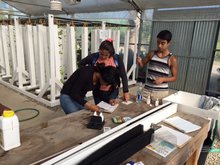0
Podcast
Community:
Mar 29, 2023
Climate change will affect everyone, so what measures can U.S. communities take now to adapt and thrive? From water-saving landscapes to strategic retreats from hazard-prone areas, experts Colleen Moore and Alexis St. Juliana explore a range of promising responses they’ve identified and explain why historically vulnerable communities must be part of the solutions.
Authored by: Colleen Moore and Alexis St. Juliana for Abt Associates
Topics: Community development, Energy, Environmental Resiliency/Climate Change, Green, Housing, Low-income, Research, Sustainability
 Shared by Sandra Ware
Shared by Sandra Ware
Sandra Ware posted a
on Mar 30, 2023
Colleen Moore and Alexis St. Juliana for Abt Associates
Climate change will affect everyone, so what measures can U.S. communities take now to adapt and thrive? From water-saving landscapes to strategic retreats from hazard-prone areas, experts Colleen Moore and Alexis St.
0
Case study
Community:
Feb 9, 2023
The following are case studies of NYCHA energy efficiency decarbonization programs. More information about the New York City Housing Authority (NYCHA) various sustainability programs can be found in our Sustainability Agenda.
Authored by: NYCHA and CLPHA
Topics: Energy, Environmental Resiliency/Climate Change, Housing, Sustainability
 Shared by Sandra Ware
Shared by Sandra Ware
Sandra Ware posted a
on Feb 9, 2023
The following are case studies of NYCHA energy efficiency decarbonization programs. More information about the New York City Housing Authority (NYCHA) various sustainability programs can be found in our Sustainability Agenda.
0
Report
Community:
Jun 29, 2022
Looking largely at the 2020-2021 school year, the report is chock-full of information about how schools apply research-based strategies in a variety of different contexts – from very different school systems across multiple states – to make research translate into positive experiences and outcomes for students and their teachers in three critical areas:
• Instructional work, where math or English-language-arts teams, including instructional coaches, special-education teachers, and English learner/multilingual teachers, work to improve the quality of instruction within classrooms.
• Early Warning and Response strategies, where grade-level or cross-functional teams work to create more supportive school environments, where young people are connected to adults, each other, and the school community.
• Well-Matched Postsecondary initiatives, where school-based teams of counselors, service providers, district and school leaders, teachers, and other staff band together to implement evidence-based strategies and processes that support postsecondary application, enrollment, and persistence.
At its heart, improvement is about learning. Each of these networks study their own work, and consistently and strategically make adaptations to increase their effectiveness as the organizational hub supporting schools. And they demonstrate how lessons need not fade away, but when codified, systematized, and shared, they can deepen our collective capacity to accelerate the field’s learning and growth.
Authored by:
Topics: Advocacy, Attendance, Child welfare, CLPHA, Community development, Education, Grade-level proficiency, Housing, Literacy, Low-income, Partnerships, Place-based, Supportive housing, Sustainability, Youth
 Shared by Karina George
Shared by Karina George
Karina George posted a
on Jun 29, 2022
Looking largely at the 2020-2021 school year, the report is chock-full of information about how schools apply research-based strategies in a variety of different contexts – from very different school systems across multiple states – to make research translate into positive experiences and outcomes f
1
Video
Community:
Jun 21, 2022
In this webinar, we heard from the Housing Authority of the City of Austin about how they fund and sustain their resident programs. Head of Strategic Initiatives and Resource Development, Catherine Crago, discussed how their nonprofit subsidiary, Austin Pathways, assists with blending and braiding financing, including corporate and philanthropic funding and in-kind gifts.
This webinar is part on an ongoing series sponsored by the Housing Is Working Group. It is a collective of public housing authorities and non-profit organizations working in health, education, and housing sectors coming together monthly via virtual meetings and other forums to discuss cross-sector work and challenges.
Authored by:
Topics: Advocacy, CLPHA, Data sharing, Housing, Housing Is Working Group, Legislation & Policy, Supportive housing, Sustainability
 Shared by Karina George
Shared by Karina George
Karina George posted a
on Jun 21, 2022
In this webinar, we heard from the Housing Authority of the City of Austin about how they fund and sustain their resident programs.
0
Video
Community:
Jun 17, 2022
The Vancouver Housing Authority collaborated with a Federally Qualified Health Center and a homeless crisis response system to develop a network of scattered-site and site-based supportive housing. This moderated discussion will cover how VHA paired Housing Choice Vouchers and public housing with a Medicaid-funded supportive housing benefit to serve people identified by the community’s Coordinated Entry as needing supportive housing. Speakers will also discuss the challenges faced through the process, model adjustments made, and evaluation of the work through matching housing data and Medicaid utilization data.
Authored by:
Topics: Advocacy, CLPHA, Data sharing, Family engagement, Health, Healthy homes, Homelessness, Housing, Legislation & Policy, Low-income, Research, Stability, Sustainability
 Shared by Karina George
Shared by Karina George
Karina George posted a
on Jun 17, 2022
The Vancouver Housing Authority collaborated with a Federally Qualified Health Center and a homeless crisis response system to develop a network of scattered-site and site-based supportive housing.
0
Video
Community:
Jun 17, 2022
The Administration for Community Living’s Aging and Disability Network is a multifaceted service infrastructure for older adults and people with disabilities so they can find housing and obtain services like chore assistance, delivered meals, and transportation. By partnering with this community infrastructure, PHAs can improve voucher utilization and leverage and align resources so older adults, people with disabilities, and people experiencing homelessness —all priority populations for federal housing assistance—can obtain supportive services needed to attain housing stability, optimize well-being, and avoid homelessness and costly institutional care. Join this session to learn about PHA partnerships with this infrastructure, discuss the dynamics of cross-sector partnerships in community-driven approaches, and discover opportunities available through the Housing and
Services Resource Center.
Authored by:
Topics: Advocacy, Community development, Disabilities, Health, Housing, Partnerships, Research, Seniors, Supportive housing, Sustainability
 Shared by Karina George
Shared by Karina George
Karina George posted a
on Jun 17, 2022
The Administration for Community Living’s Aging and Disability Network is a multifaceted service infrastructure for older adults and people with disabilities so they can find housing and obtain services like chore assistance, delivered meals, and transportation.
0
Video
Community:
Jun 17, 2022
Housing providers are uniquely positioned to find innovative and meaningful ways to engage residents with lived experience in program design and implementation to ensure investments are focused, efficient, and culturally appropriate. Learn how the King County Housing Authority in Washington and The Community Builders in Cincinnati, OH are responding to the needs and desires of their residents in new ways that leverage the assets and strengths of their residents to ensure that young children thrive. Attendees will leave this session with new ideas to incorporate resident input in early childhood programming to make it more effective.
Authored by:
Topics: Advocacy, CLPHA, Education, Family engagement, Housing, Low-income, Research, Supportive housing, Sustainability
 Shared by Karina George
Shared by Karina George
Karina George posted a
on Jun 17, 2022
Housing providers are uniquely positioned to find innovative and meaningful ways to engage residents with lived experience in program design and implementation to ensure investments are focused, efficient, and culturally appropriate.
0
Video
Community:
Jun 17, 2022
This session will review the extent to which local jurisdictions engaged with school districts in the 2016-17 Affirmatively Furthering Fair Housing (AFFH) process and preview the potential for PHAs to engage with school districts and school data in the upcoming renewal of the HUD AFFH process.
Authored by:
Topics: Advocacy, Attendance, CLPHA, Data sharing, Education, Family engagement, Housing, Legislation & Policy, Research, Sustainability
 Shared by Karina George
Shared by Karina George
Karina George posted a
on Jun 17, 2022
This session will review the extent to which local jurisdictions engaged with school districts in the 2016-17 Affirmatively Furthering Fair Housing (AFFH) process and preview the potential for PHAs to engage with school districts and school data in the upcoming renewal of the HUD AFFH process.
0
Video
Community:
Jun 17, 2022
The Low Income Investment Fund (LIIF) will moderate a unique cross-sector panel of housing and early care and education (ECE) experts on strategies and best practices for co-locating ECE facilities within affordable housing developments. Discussion of specific financing techniques and site design considerations from existing co-located facilities will provide attendees lessons on policy and programmatic changes needed to incentivize co-location. Panelists include innovators in affordable housing development, government and public sectors, early care and education operations, and community development finance.
Authored by:
Topics: Advocacy, Broadband, Child welfare, CLPHA, Family engagement, Food insecurity, Health, Housing, Legislation & Policy, Low-income, Nutrition, School-readiness, Supportive housing, Sustainability
 Shared by Karina George
Shared by Karina George
Karina George posted a
on Jun 17, 2022
The Low Income Investment Fund (LIIF) will moderate a unique cross-sector panel of housing and early care and education (ECE) experts on strategies and best practices for co-locating ECE facilities within affordable housing developments.
0
Video
Community:
Jun 17, 2022
Public and affordable housing agencies and organizations have the potential to serve as a crucial foundation for promoting early school success for economically challenged, fragile and otherwise marginalized children and families through a 24/7/365 multigenerational system of support and an ability to meet families 'where they are.' During this engaging session, Housing Is and our long-time partner The Campaign for Grade-Level Reading will elevate the critical importance of these housing-education partnerships, with special attention to the way in which such collaborations begin. This plenary will explore initial partnership development work taking place in Kansas City, MO, one of the 20 finalist communities recently announced for the 2022 All-America City Awards. The theme of this year's award is "Housing as a Platform to Promote Early School Success and Equitable Learning Recovery." Attendees have the unique opportunity to hear from a partnership in its earlier stages of development and learn alongside the speakers how critical cross-sector work can be launched.
Authored by:
Topics: Advocacy, CLPHA, Early childhood, Education, Healthy homes, Housing, Low-income, Supportive housing, Sustainability
 Shared by Karina George
Shared by Karina George
Karina George posted a
on Jun 17, 2022
Public and affordable housing agencies and organizations have the potential to serve as a crucial foundation for promoting early school success for economically challenged, fragile and otherwise marginalized children and families through a 24/7/365 multigenerational system of support and an ability
0
Report
Community:
Apr 1, 2019
Thoughtful and thorough preparations for the disruptive effects of global climate change can provide a range of options for communities and households that would respect their historical assets, current and potential levels of social cohesion, desires for their own life outcomes, and opportunities for collective
action. In all cases, people and communities should exercise meaningful voice and power over decisions about where, how, and how much to adapt to local climate effects. Regardless of the combination of physical and social interventions communities adopt, inclusion and equity must be fundamental to both the process of selection and the outcomes of the options selected.
Authored by: The Urban Institute
Topics: Housing, Legislation & Policy, Research, Sustainability
 Shared by Housing Is
Shared by Housing Is
Housing Is posted a
on Apr 4, 2019
Thoughtful and thorough preparations for the disruptive effects of global climate change can provide a range of options for communities and households that would respect their historical assets, current and potential levels of social cohesion, desires for their own life outcomes, and opportunities f
0
News Article
Community:
Mar 25, 2019
In California, where home prices are pushing people farther from their jobs, rising traffic is creating more pollution.
Authored by: Scott Wiener and Daniel Kammen
Topics: Green, Housing, Sustainability, Transportation, West Coast
 Shared by Mica O'Brien
Shared by Mica O'Brien
Mica O'Brien posted a
on Mar 26, 2019
Scott Wiener and Daniel Kammen
In California, where home prices are pushing people farther from their jobs, rising traffic is creating more pollution.
0
Publication
Community:
Evidence shows that retrofitting the entire stock of multifamily apartment buildings in the United States could save tenants and property owners $8 billion a year in energy costs and reduce electricity consumption by almost 15 percent. Amid the rising cost of housing, energy efficiency upgrades can provide much-needed relief to low-income families and help keep rental stock affordable, but few documented examples showcase the benefits of energy retrofits in multifamily housing. Addressing this gap, this study measures the impact of a collaborative energy efficiency program in Orlando, Florida, analyzing energy costs before and after retrofits in four multifamily apartment complexes.
Authored by: Nicholas Taylor, Jennison Searcy, and Pierce Jones for Energy Efficiency
Topics: Energy, Housing, Low-income, Research, Sustainability
 Shared by Housing Is
Shared by Housing Is
Housing Is posted a
on Jan 31, 2019
Nicholas Taylor, Jennison Searcy, and Pierce Jones for Energy Efficiency
Evidence shows that retrofitting the entire stock of multifamily apartment buildings in the United States could save tenants and property owners $8 billion a year in energy costs and reduce electricity consumption by almost 15 percent.
0
Interactive
Community:
Nov 29, 2018
With political divisions on the rise and global cooperation imperiled, city officials worldwide are stepping up to lead, solving local problems while sharing solutions and innovations across borders. Making cities such as New York, Pittsburgh, and Los Angeles inclusive, safe, and sustainable is vital to the future of the United States—and the globe. Driven by the need to act locally while thinking globally, a growing number of metro areas are adapting the Sustainable Development Goals (SDGs) as a blueprint for progress.
Authored by: The Brookings Institution
Topics: Community development, Housing, Partnerships, Place-based, Sustainability
 Shared by Mica O'Brien
Shared by Mica O'Brien
Mica O'Brien posted a
on Dec 3, 2018
The Brookings Institution
With political divisions on the rise and global cooperation imperiled, city officials worldwide are stepping up to lead, solving local problems while sharing solutions and innovations across borders.
0
News Article
Community:
Sep 24, 2018
The Housing Authority of the County of Los Angeles (Calif.) developed an innovative community garden to provide access to affordable and fresh food as well as skills training and job opportunities.
Authored by: Ashanti Wright for Journal of Housing & Community Development
Topics: Community development, Food insecurity, Green, Health, Housing, Low-income, Nutrition, Place-based, Sustainability, Youth
 Shared by Mica O'Brien
Shared by Mica O'Brien
Mica O'Brien posted a
on Oct 30, 2018
Ashanti Wright for Journal of Housing & Community Development
The Housing Authority of the County of Los Angeles (Calif.) developed an innovative community garden to provide access to affordable and fresh food as well as skills training and job opportunities.
0
Video
Community:
Dec 12, 2017
In a new three-part video series, the American Council for an Energy-Efficient Economy explores how energy efficiency can improve people’s health. We hear the stories of homeowners in three states. To look at efficiency’s impact in rural areas, Part One takes us to McDowell County, West Virginia.
Authored by: Sarah Hayes for the American Council on an Energy-Efficient Economy
Topics: Asthma, Energy, Green, Health, Healthy homes, Housing, Place-based, Safety, Seniors, Sustainability
 Shared by Housing Is
Shared by Housing Is
Housing Is posted a
on Jul 5, 2018
Sarah Hayes for the American Council on an Energy-Efficient Economy
In a new three-part video series, the American Council for an Energy-Efficient Economy explores how energy efficiency can improve people’s health. We hear the stories of homeowners in three states. To look at efficiency’s impact in rural areas, Part One takes us to McDowell County, West Virginia.


 Shared by Sandra Ware
on Mar 30, 2023
Shared by Sandra Ware
on Mar 30, 2023

 Shared by Sandra Ware
on Feb 9, 2023
Shared by Sandra Ware
on Feb 9, 2023
 Shared by Karina George
on Jun 29, 2022
Shared by Karina George
on Jun 29, 2022
 Shared by Karina George
on Jun 21, 2022
Shared by Karina George
on Jun 21, 2022
 Shared by Karina George
on Jun 17, 2022
Shared by Karina George
on Jun 17, 2022
 Shared by Karina George
on Jun 17, 2022
Shared by Karina George
on Jun 17, 2022
 Shared by Karina George
on Jun 17, 2022
Shared by Karina George
on Jun 17, 2022
 Shared by Karina George
on Jun 17, 2022
Shared by Karina George
on Jun 17, 2022
 Shared by Karina George
on Jun 17, 2022
Shared by Karina George
on Jun 17, 2022
 Shared by Karina George
on Jun 17, 2022
Shared by Karina George
on Jun 17, 2022
 Shared by Housing Is
on Apr 4, 2019
Shared by Housing Is
on Apr 4, 2019


 Shared by Housing Is
on Jan 31, 2019
Shared by Housing Is
on Jan 31, 2019


 Shared by Housing Is
on Jul 5, 2018
Shared by Housing Is
on Jul 5, 2018